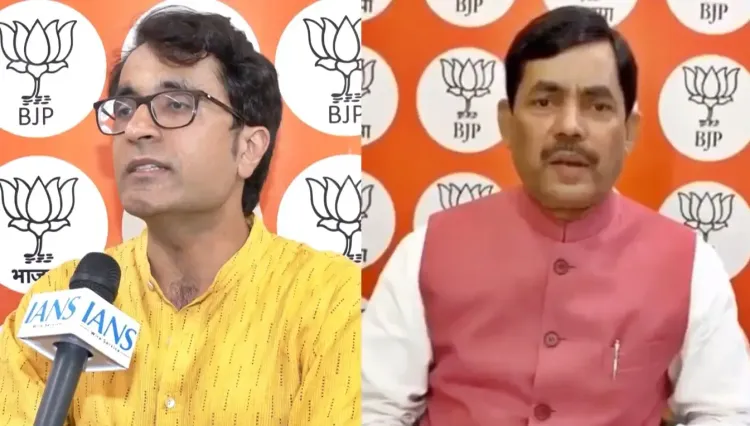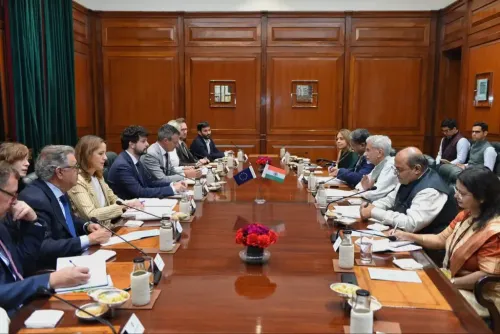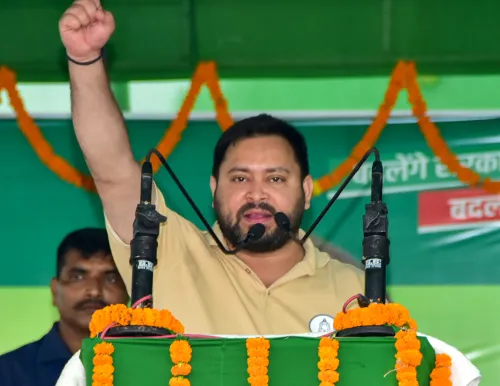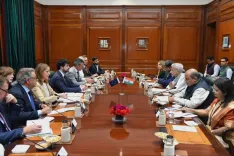Is Congress Taking Orders Directly from Pakistan?

Synopsis
Key Takeaways
- BJP accuses Congress of anti-national behavior.
- Controversial post linked to Pahalgam terror attack.
- Political leaders call for unity in crisis times.
- Social media plays a significant role in political discourse.
- Public opinion heavily influences political narratives.
New Delhi, April 29 (NationPress) BJP national spokesperson Pradeep Bhandari has issued a fierce critique of the Congress party regarding its recent social media activity, labeling it as "anti-national" and accusing it of "receiving directives from Pakistan".
The uproar began following a post from the official Congress account on Monday, which featured an image of a man in a kurta-churidar missing both a neck and head, paired with a caption stating, "Jimmedari ke samay-- GAYAB" (translated as "Invisible at the time of responsibility").
This enigmatic image has sparked discussions online, particularly in light of the Pahalgam terror attack on April 22, which resulted in the deaths of 26 individuals, including 25 tourists and one local.
In response to the post, Bhandari remarked to IANS, "The Congress party is allegedly following orders from Pakistan. Today, the Congress party has become a tool of Pakistan's deep state. Former Pakistani minister Fawad Chaudhry commented on this tweet and retweeted it, clearly indicating that there is a collaboration between Congress and Pakistan's terror deep state."
He further stated, "Siddaramaiah is reportedly more popular in Pakistan than in India. Congress's Jammu and Kashmir chief has suggested talks with Pakistan, even going as far as to offer their hands in submission. Saifuddin Soz says that Pakistan should be trusted."
Bhandari challenged the credibility of Congress's claims made during the all-party meeting on April 25, where the party supposedly pledged full support to the government in its battle against terrorism.
"All these statements come at a time when Congress, in the all-party meeting, said that the party is with the government. However, these statements make it clear that their policies and intentions are in support of Pakistan's terrorism. Congress has been exposed as an anti-national party," he stated.
"At a time when all the parties should be united, Congress is seen siding with Pakistan against the victims. It's not just a coincidence; it is by design and through patterns. The Congress party is taking its orders directly from Pakistan," Bhandari concluded.
BJP national spokesperson Shahnawaz Hussain also condemned the Congress for the social media post and for posing "baseless" questions against the government during such sensitive times.
"The Congress party has committed a disgraceful act by posting a picture of the Prime Minister where his head is missing. This is not just an insult to the Prime Minister, but to the entire nation. How can the main opposition party behave this way? The country will never forgive such an act," he expressed.
"The act that Congress has done today, in such a matter where the entire country is standing united, is inappropriate. It is releasing posters, demanding special sessions. Does it not have trust in our government and army? The Congress should not stoop so low," Hussain added.
The Congress's social media post has drawn backlash across various platforms, with many users questioning its timing and message. Critics have connected it to the April 22 terror attack in Pahalgam, arguing that such communication undermines national unity during a crisis.
Despite its assurances of cooperation with the government, Congress continues to face criticism over statements from its leaders that are being widely circulated and discussed in Pakistani media, further intensifying the political confrontation.









